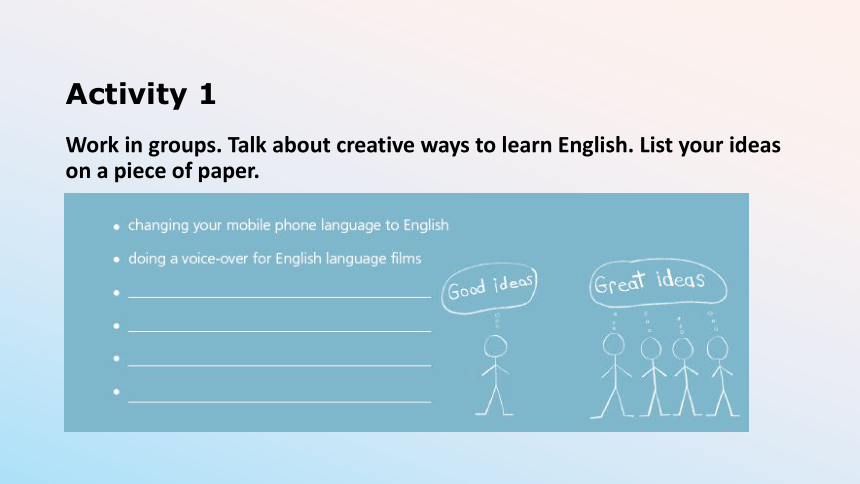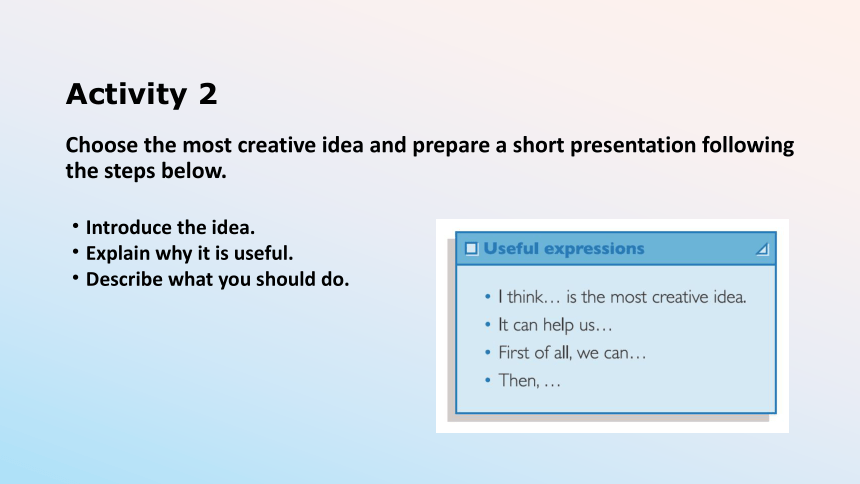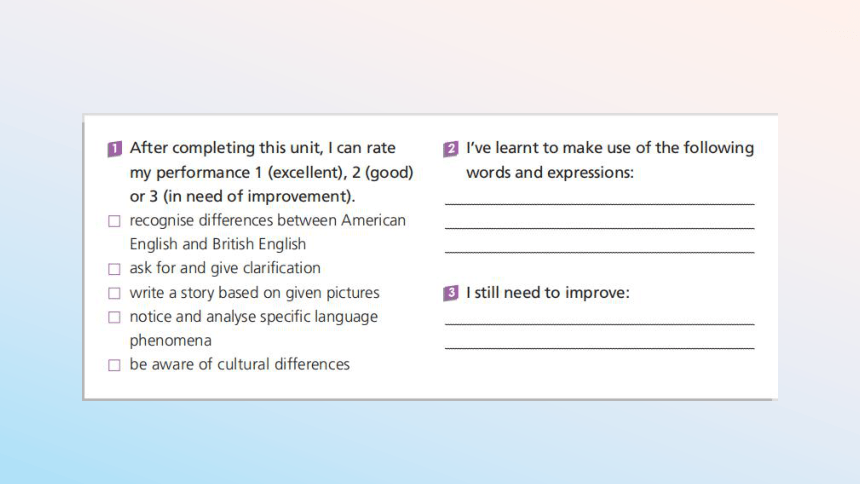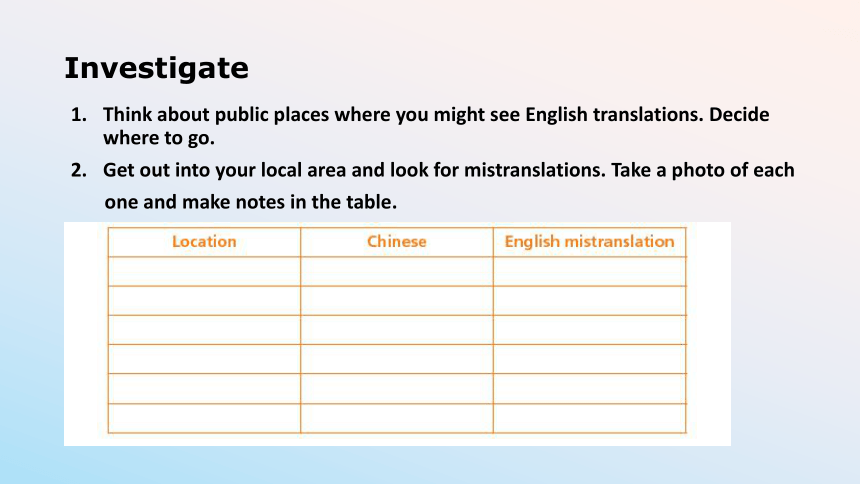Unit 2 Exploring English :Presenting ideas & Reflection课件(共26张)--2024-2025学年高中《英语》必修1(外研版)
文档属性
| 名称 | Unit 2 Exploring English :Presenting ideas & Reflection课件(共26张)--2024-2025学年高中《英语》必修1(外研版) |  | |
| 格式 | pptx | ||
| 文件大小 | 1.5MB | ||
| 资源类型 | 教案 | ||
| 版本资源 | 外研版(2019) | ||
| 科目 | 英语 | ||
| 更新时间 | 2025-06-07 18:35:35 | ||
图片预览









文档简介
(共26张PPT)
Unit 2 Exploring English
Presenting ideas & Reflection
新标准《英语》高中必修第一册
Presenting ideas
Activity 1
Work in groups. Talk about creative ways to learn English. List your ideas on a piece of paper.
Activity 2
Choose the most creative idea and prepare a short presentation following the steps below.
Introduce the idea.
Explain why it is useful.
Describe what you should do.
Activity 3
Present your idea to the class.
Reflection
Project
Investigate
Think about public places where you might see English translations. Decide where to go.
Get out into your local area and look for mistranslations. Take a photo of each
one and make notes in the table.
Plan
1. Discuss what the mistake(s) is / are in each mistranslation:
grammar mistake(s)
wrong choice of words
spelling mistake(s)
word for word translation
other
2. Work out what the correct translations should be. You may use a
dictionary.
Create
Make a list of your corrections using a notebook or slide presentation. Include any photos you have taken.
Present
Show your list of mistranslations to the class. Explain where you saw them, why
they are incorrect and what corrections you would make.
Developing ideas
Activity 1
What’s up (What’s going on )
ring a bell (to sound familiar)
small potatoes (something unimportant or insignificant)
toilet water (a light perfume that does not have a very strong smell)
at sixes and sevens (in a confused, badlyorganised, or difficult situation)
green fingers (natural ability in growing plants)
pull up one’s socks (to make an effort to improve your work or behaviour because it is not good enough)
Activity 2
Read the passage and find the words or expressions that caused the misunderstandings.
1 had a frog in her throat
2 the first floor
3 wicked
4 Not bad
Activity 3
a (British English) the floor of a building above the one at ground level;
(American English) the floor of a building at ground level
b pretty good, better than you expected
c unable to speak clearly for a short time because your throat is dry or
blocked
d morally wrong and intending to hurt people; (informal) very good,
fantastic
a–Sophie’s post b–Zheng Xu’s post c–Yancy’s post d–Julien’s post
Think & Share
Which post do you find most interesting Why
How would you deal with the situations described in the posts
What examples of Internet language are used in the passage What do they mean
Do you know of any Chinese expressions that often cause misunderstandings for people from other countries Share them with the class.
Activity 4
Work in pairs. Retell the situations in the four posts.
Writing a story about a misunderstanding in English
Activity 5
Who were the people in the story
Where did the story take place
What happened
What caused the misunderstanding
Activity 6
Write a paragraph to tell the story.
Activity 7
Share your story with the class.
Last summer, I stayed with a British host family.
One day, I was really surprised when Jeremy, the son of the family, told me that we would have toad-in-the-hole for dinner. I wasn’t sure whether we were going to eat a real toad in a hole. If so, how terrible! I joined them at dinner time with butterflies in my stomach. To my astonishment, a dish of sausages cooked in Yorkshire pudding (a mix that tastes a bit like pancakes) was served on the table, and it tasted delicious. It turned out that toad-in-the-hole is a typical dish for a British dinner, and there’s no toad! What an amazing experience! It was interesting to try such yummy food with a strange name.
Starting out
Activity 1
According to Chart 1, which language has the largest number of native speakers According to Chart 2, which language has the largest number of learners
What can you learn from Chart 3 Why do you think many people in China learn English
Activity 2
Which countries mentioned in the video have English as their first language
Where do a third of English words come from What examples are given in the video
THANK YOU
Unit 2 Exploring English
Presenting ideas & Reflection
新标准《英语》高中必修第一册
Presenting ideas
Activity 1
Work in groups. Talk about creative ways to learn English. List your ideas on a piece of paper.
Activity 2
Choose the most creative idea and prepare a short presentation following the steps below.
Introduce the idea.
Explain why it is useful.
Describe what you should do.
Activity 3
Present your idea to the class.
Reflection
Project
Investigate
Think about public places where you might see English translations. Decide where to go.
Get out into your local area and look for mistranslations. Take a photo of each
one and make notes in the table.
Plan
1. Discuss what the mistake(s) is / are in each mistranslation:
grammar mistake(s)
wrong choice of words
spelling mistake(s)
word for word translation
other
2. Work out what the correct translations should be. You may use a
dictionary.
Create
Make a list of your corrections using a notebook or slide presentation. Include any photos you have taken.
Present
Show your list of mistranslations to the class. Explain where you saw them, why
they are incorrect and what corrections you would make.
Developing ideas
Activity 1
What’s up (What’s going on )
ring a bell (to sound familiar)
small potatoes (something unimportant or insignificant)
toilet water (a light perfume that does not have a very strong smell)
at sixes and sevens (in a confused, badlyorganised, or difficult situation)
green fingers (natural ability in growing plants)
pull up one’s socks (to make an effort to improve your work or behaviour because it is not good enough)
Activity 2
Read the passage and find the words or expressions that caused the misunderstandings.
1 had a frog in her throat
2 the first floor
3 wicked
4 Not bad
Activity 3
a (British English) the floor of a building above the one at ground level;
(American English) the floor of a building at ground level
b pretty good, better than you expected
c unable to speak clearly for a short time because your throat is dry or
blocked
d morally wrong and intending to hurt people; (informal) very good,
fantastic
a–Sophie’s post b–Zheng Xu’s post c–Yancy’s post d–Julien’s post
Think & Share
Which post do you find most interesting Why
How would you deal with the situations described in the posts
What examples of Internet language are used in the passage What do they mean
Do you know of any Chinese expressions that often cause misunderstandings for people from other countries Share them with the class.
Activity 4
Work in pairs. Retell the situations in the four posts.
Writing a story about a misunderstanding in English
Activity 5
Who were the people in the story
Where did the story take place
What happened
What caused the misunderstanding
Activity 6
Write a paragraph to tell the story.
Activity 7
Share your story with the class.
Last summer, I stayed with a British host family.
One day, I was really surprised when Jeremy, the son of the family, told me that we would have toad-in-the-hole for dinner. I wasn’t sure whether we were going to eat a real toad in a hole. If so, how terrible! I joined them at dinner time with butterflies in my stomach. To my astonishment, a dish of sausages cooked in Yorkshire pudding (a mix that tastes a bit like pancakes) was served on the table, and it tasted delicious. It turned out that toad-in-the-hole is a typical dish for a British dinner, and there’s no toad! What an amazing experience! It was interesting to try such yummy food with a strange name.
Starting out
Activity 1
According to Chart 1, which language has the largest number of native speakers According to Chart 2, which language has the largest number of learners
What can you learn from Chart 3 Why do you think many people in China learn English
Activity 2
Which countries mentioned in the video have English as their first language
Where do a third of English words come from What examples are given in the video
THANK YOU
